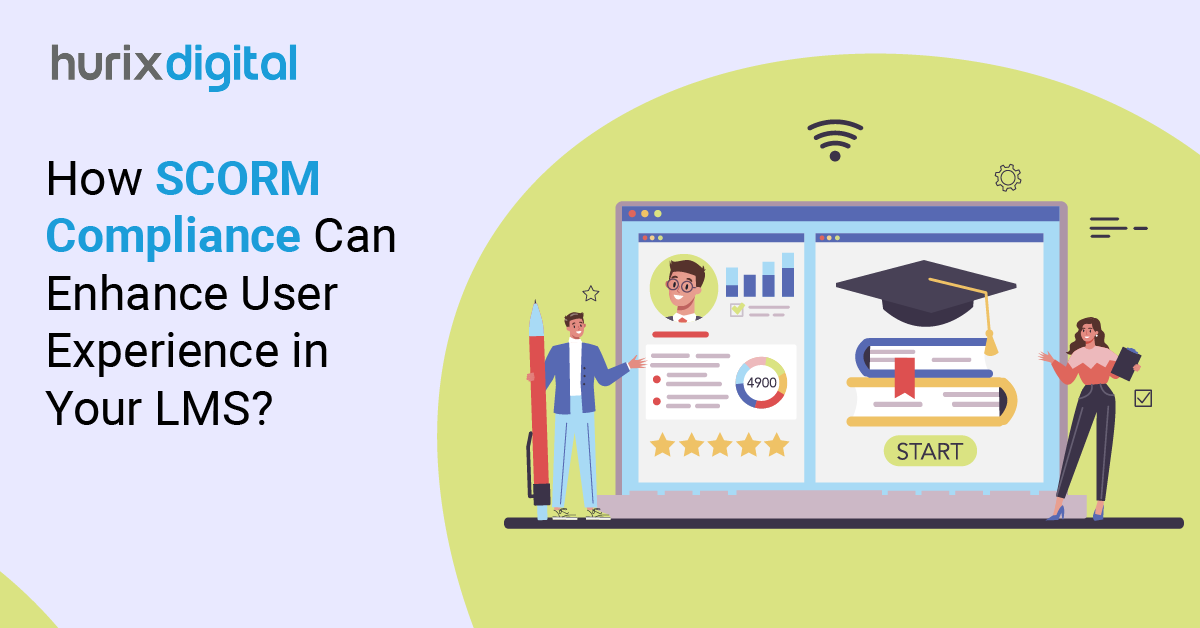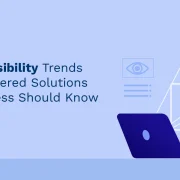
What is a Learning Management System in Education? Ways to Use LMS in Education
Did you realize the traditional classroom-based approach is fast losing its significance due to the use of LMS in education?
Knowing what is LMS and its importance in education is immense. Using Learning Management Systems in education offers a smart alternative to schools and education in such a scenario and allows instructors to deliver customized content, leverage various pedagogical models, and engage their students much better than previously possible.
In fact, a report suggests that one out of five LMS implementations takes place in the field of education, which is an incredible stat.
Before going into the details of how educational institutes can leverage this opportunity better, Let’s first understand a bit about LMS in detail.
Table of Contents:
- What is LMS in Education?
- How Can Educational Institutes Leverage Learning Management Systems in Education?
- Top 8 Ways an LMS Can Help Your Overall Professional Development Program?
- Future Trends of LMS in Education
- Bottom Line
What is LMS in Education?
A Learning Management System in Education is essentially a software tool used to deliver learning content and other resources to end users.
The LMS market is anticipated to reach $232.8 billion by 2032, with a CAGR of 17% throughout the forecast period. The popularity of LMS in teaching is attributed to the ease that it offers to teachers and instructors in delivering study material, monitoring learner participation, and assessing performance.
Also Read: Importance of Digital Curriculum Development in Higher Education
How Can Educational Institutes Leverage Learning Management Systems in Education?
Let us learn about the importance of learning management system in education through some facts:
- % of students prefer online learning over traditional classroom methods, showing flexibility and accessibility as prime advantages.
- LMS sites have approximately 73.8 million global users, showing that it is indeed gaining momentum and becoming popular worldwide.
- % of higher education faculty highlighted the critical role of LMS within their teaching practices.
Although there are various ways educational institutes can impart training to learners, one of the most effective means of delivering online training is through a Learning Management System (LMS).
Here’s how educational institutes can leverage LMS for better results:
1. Offer Centralized Learning
The primary advantage of any LMS in education is its centralized source of learning. It allows institutes to save all the eLearning content in one single place instead of having it scattered at different locations.
This helps in both reducing the risk of losing important data/content and enhancing the overall efficiency of the system.
2. Unlimited Customization Options
LMS can be a great tool for higher schools and colleges as it gives them the freedom of unlimited customization options. Instructors enjoy the liberty to tailor the e-learning content for the courses as much as required from anywhere and at any given point in time.
3. Tracking Reporting
Implementing learning management systems in education allows instructors to keep track of a learner’s progress in terms of course completion, identification of knowledge gaps, participation and engagement level, and time taken to complete the course.
Reporting is another exciting feature of LMS that educational institutes can leverage. These detailed reports can help institutes in the evaluation of course suitability in terms of meeting the present requirements of the schools and colleges and whether they require any modification.
4. Easy Upgrades
Schools and colleges generally have many courses covering topics that are in the process of rapid development, requiring constant changes and upgradation of the content and sources.
Learning Management Systems make it simple to update existing content without the need to make changes for each student separately, as the upgraded content gets distributed to the learners automatically.
5. Robust Evaluation System
With an LMS, you can easily evaluate your students before, during, and at the end of a course without interfering with the overall learning process.
Furthermore, the top LMS systems available in the market can easily integrate learning and evaluation under the same online platform and also allow students to review their own performance as well. Here are 10 Advantages of e-learning in Higher Education over Traditional Methods.
6. Simplify Learning
An LMS can help simplify and revolutionize learning. The fact that it is easy to use and doesn’t require much expert intervention makes LMS a great tool for educators and a powerful learning experience for students.
Top 8 Ways an LMS Can Help Your Overall Professional Development Program?
Using a single learning management system in education to deliver content to students can increase the adoption rate, minimize costs, and cut down the training time substantially.
1. Supports Active Learning
Any learning experience can only be meaningful if it’s relevant and authentic. An LMS allows learners to engage in hands-on, relevant, and real-world activities for a fulfilling learning experience.
An LMS encourages active learning by providing experiential, hands-on experiences and real-world applications. It:
- Enables learners to participate in active learning activities like quizzes, simulation exercises, and problem-solving activities
- Provides learners with relevant, authentic content that mirrors real-world challenges and makes learning more impactful
- Makes students enthusiastic about a personalized learning journey that is customized to a particular learner’s requirements and style
2. Enables Communication and Collaboration
A learning management system in education provides a common collaborative space for content sharing, feedback, and personal interaction. It also allows educators to engage at any time, any place, and from any device.
A learning management system in education encourages collaboration with learners and educators through:
- Virtual spaces for group discussions, brainstorming, and peer-to-peer learning.
- Real-time collaborations through video conferencing, shared documents, and instant messaging.
- Connections between educators and learners are available anytime, anywhere, on any device.
3. Offer Content-Focused
Learning Using a Learning Management System in education gives instructors the advantage of accessing expert advice and relevant content that is specific to their teaching context. This, in turn, can have an immediate and valuable impact on their classrooms.
LMS platforms are built to host high-quality, relevant content delivery. It offers:
- Instruction access to extensive and expert-verified storage of resources
- Learning materials can be customized to match specific course objectives
- Overall learning experience as the content stays fresh and relevant
- Alignment with best industrial practices and real-world scenarios
4. Saves Time and Money
Guide:
How to Choose the Right LMS for Your Business
Schools and colleges generally struggle with resource constraints while implementing traditional learning methodologies. However, with a learning management system, they can cut down their expenses drastically by taking advantage of LMS as a standalone asset for managing teaching and learning.
An LMS is a cost-effective and time-efficient alternative to traditional methods. It:
- Helps minimize the use of print materials, face-to-face workshops, and traveling costs.
- Automates management work like grading, reporting, and attendance tracking.
- Has everything in one place as it centralizes all learning and teaching resources, making them accessible easily, thereby minimizing redundancy.
5. Encourage Continuous Learning
An LMS ensures that the content is readily available for both students and faculty members. Instructors can also continue to engage with materials regularly and support proactive learning strategies. Learning management system for students helps in the following:
- Availing distributed learning resources for lecturers and students, preventing breakages in the flow.
- Supporting lifelong learning through recurring updates, emerging courses, and editorial works.
- Enabling microlearning-the process of learning information in small, manageable pieces over time.
6. Facilitate Constant Communication
An LMS allows educators to share pedagogical resources, have one-to-one discussions with peers, and receive guided expert support through online discussions. Constant communication is a basis for professional development, and an LMS makes it easier. It:
- Allows instructors to offer insights, updates, and feedback directly to students.
- Facilitates the type of peer-to-peer communication found between participants in forums, chat rooms, and group projects.
- Provides transparent and ongoing communication between educators, learners, and administrators.
7. Support Use of Useful Models and Modelling
A Learning management system provides instructors and faculty members with clear demonstrations of best practices, tools to allow them to engage in peer observation sessions, and a huge repository of exemplary lesson plans to refer to. An LMS uses:
- Lesson plan templates, teaching strategies, and curriculum design templates.
- Peer observation and collaboration to perfect teaching techniques.
- Access to best practices and case studies that help teachers keep themselves updated with industry developments.
8. Offers Greater Flexibility and Space for Pedagogical Experiments
Unlike traditional classroom-based teaching, where the instructor follows a prescribed approach, online methods of teaching with the help of an LMS allow instructors to experiment with the application of various learning techniques such as blended learning, flipped learning, social learning, rapid learning, storytelling, and more depending on what works best for the learners. Here are some key features:
- LMS flexibility allows teachers to improvise and innovate.
- It motivates the use of creative approaches like storytelling and rapid learning, among others.
- It necessitates changes in the needs of learners that introduce an inclusive approach to teaching.
Also Read: Why Should Colleges and Universities Develop eLearning Programs?
Future Trends of LMS in Education
Here are the major trends that are defining the importance of learning management system in education:
1. AI-Powered Personalization
Artificial Intelligence enables LMS sites to provide customized learning journeys based on individual requirements, preferences, and performance. Intelligent suggestions for courses, resources, and activities increase the effectiveness of learning.
2. Gamification and Immersive Learning
Gamified elements are being added to LMS to enhance engagement. AR and VR immersive technologies can be integrated into LMS to develop realistic simulations that interact with learners.
3. Mobile-First Learning
With the increased use of mobile, accessibility via mobile will lead to LMS demanding the utmost priority given to learners’ needs. Push notifications, offline learning capabilities, and responsive design ensure that mobile LMS is essential. 91% of HR professionals find eLearning tools effective in employee development, reflecting their growing importance in the corporate sector.
4. Integration with Advanced Analytics
Advanced analytics in LMS can enable teachers to monitor learners’ progress, engagement, and outcomes effectively. Predictive analysis can help with actionable insights into identifying learners at risk and improve teaching strategies accordingly.
5. Social and Collaborative Learning
Future LMS will focus more on social learning for learners to connect with each other as well as with the organization. Integration with social media and professional networks helps in enhancing opportunities for peer-to-peer learning.
6. Microlearning and Bite-Sized Content
Short and focused modules of learning are gaining popularity; hence, making learning more consumable. LMSs are increasingly being optimized to provide concise content that suits the lifestyle of modern learners.
Microlearning, which involves delivering content in small, focused segments, enhances focus and long-term retention by up to 80%. 94% of L&D professionals prefer microlearning to other eLearning tools due to its effectiveness in engaging learners.
7. Scalability and Accessibility-Centric LMS on the Cloud
Cloud-based LMS is predicted to grow at a CAGR of 24.59% from 2021 to 2029, highlighting the shift towards flexible, on-demand learning platforms. Cloud-based LMS solutions are scalable, cost-effective, and can be easily set up. They enable continuous learning experiences and provide secure data storage with seamless updations.
Bottom Line
The role of LMS in education is more crucial than ever. This guide throws light on what is LMS in education and highlights how it continues to revolutionize teaching and learning. Future trends empower educators and institutions to offer more engaging and efficient learning experiences.
Ready to rethink your education strategy with LMS? Collaborate with Hurix Digital, the leader in digital content and learning solutions. Know how we may help you implement innovative LMS technology for your institution to achieve its goals. To understand how you can take your learning experience to the next level, reach out to our experts.









